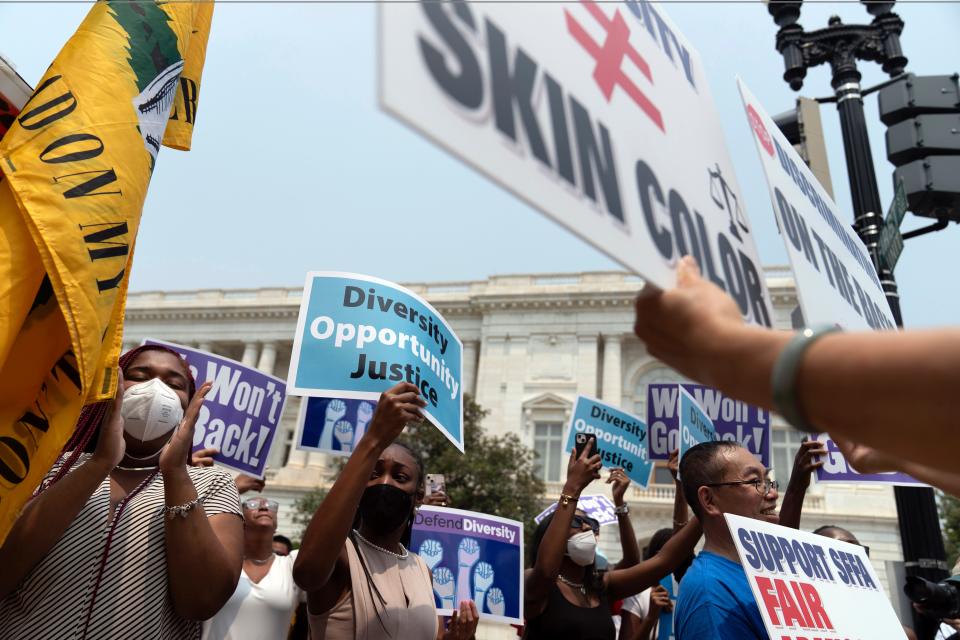Our multiracial children are changing America faster than the Supreme Court
My mother grew up on a small farm in northeastern Pennsylvania. My father grew up in Brooklyn, N.Y.
Their ancestors were predominately French, British, German and Swedish, and that intermingling of nationalities over the years eventually blurred any customs that might have traveled from the Old World.
My mother is a genealogist who has now traced our family roots back to 19 people who crossed the Atlantic on the Mayflower. To see photos from our family reunions over the years is to see the children of white European immigration.
We are all Americans living in a modern multiethnic, multiracial society. There is no way to live in such a place and not be profoundly changed by it.
My new granddaughter is changing the world
This past week, my eldest daughter, who is African American, gave birth to a baby girl. Her husband is the son of a Latino mother and a German-American father.
The baby has black curly hair like her mother and fair skin like her father. We don’t know where the blue eyes came from or whether they’ll stay blue. But no one spends much time thinking about it.
Cherished is cherished.
When my youngest daughter, who is Latino and has Down syndrome, saw the new baby, she warmed the room with her exuberance. “COOL!” she shouted and turned both thumbs up.
My mother, the descendent of Pilgrims, is now great-grandmother to 11 children. More than half of those great-grandkids are children of color — African American, Tongan, Latino.
They are part of a growing wave of mixed-race children who are rapidly changing our world.
From 2010 to 2020, America’s multiracial population has more than tripled, from 9 million people to 33.8 million, a 276% increase, according to the U.S. Census Bureau.
Affirmative action ruling follows the trend

I tell you this to explain the inevitably of Thursday’s U.S. Supreme Court ruling that removes racial preferences in university admissions.
The Roberts court — the most diverse Supreme Court in our history — is merely following the evolving facts on the ground.
In fact, the court saw this coming.
Twenty years ago, writing in Grutter v. Bollinger, which set precedent in university admissions, former Arizona ranch girl and first women Supreme Court justice Sandra Day O’Connor wrote that the “court expects that 25 years from now, the use of racial preferences will no longer be necessary.”
The court was right.
Another view: Affirmative action gave me an opportunity
In a nation in which racial-ethnic divides grow more blurred by the day, it is becoming nigh impossible to social-engineer a meaningful student body based on race.
The burst of identity politics we saw over the last decade is probably the death throes of a racial politics that America cannot sustain.
Liberal California led us to this moment
If you are a liberal or a Democrat or a person of color, you might take umbrage with that. But understand we’ve been led here by the most diverse and perhaps most liberal state in America — California.
Twenty-seven years ago, Californians approved Proposition 209 to amend their state constitution and outlaw racial discrimination and preferences in public hiring, contracting and education.
In 2020, they were given the chance through Proposition 16 to repeal that earlier law and reestablish affirmative action.
The liberal establishment, including lawmakers, universities and corporations, virtually all supported the return to racial preferences. They outspent their political opponents by 16 to 1.
Those opponents of affirmative action were led by an African American man, Ward Connerly, and an Asian American woman, Wenyuan Wu.
In the 2020 California election, in which Joe Biden defeated Donald Trump by nearly 30 points, affirmative action went down in a landslide — 57% to 43%.
“As it turns out,” Connerly wrote in USA Today, “embracing equality, not mapping out racial proportions, is an American value.”
America is changing in ways we are only beginning to appreciate.
For me, that’s a new granddaughter named Rio, who is Black and white and brown and beautiful!
Phil Boas is an editorial columnist for The Arizona Republic. Email him at phil.boas@arizonarepublic.com.
This article originally appeared on Arizona Republic: Our multiracial society has outgrown affirmative action

